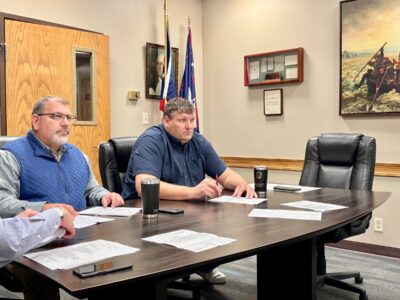EPA officials host roundtable in East Palestine
By Stephanie Elverd
Special to The Times
EAST PALESTINE– In his third visit to East Palestine since the Norfolk Southern train derailment, U.S. Environmental Protection Agency Administrator Michael Regan held a roundtable with teachers and students at East Palestine High School and met with local business owners Tuesday to address concerns about air, water and soil quality and residual impacts as cleanup efforts continue.
“We have a complete inventory of everything that was on that train and we know the kind of adverse impacts those toxins can have on health at certain levels. There are no gaps in the testing,” Regan said. “If there are concerns or folks who have concerns like the legitimate questions that were posed by the local business owners and students in terms of dioxins, we are going to work to alleviate those concerns.”
EPA Regional Administrator Debra Shore further explained the decision not to test the air for dioxins specifically during the interagency daily press briefing held later in the day Monday at East Palestine City Park Community Center.
“After the vent and burn we looked for the primary byproducts of the burning of vinyl chloride which are phosgene and hydrogen chloride,” Shore said. “Dioxin is a secondary byproduct. We didn’t find elevated levels of those primary byproducts which suggested to our scientists that there was not a further risk of dioxin exposure.”
Shore said that the EPA continues to monitor air quality at 15 stations within East Palestine and that all 578 home re-entry screenings “found no exceedance of volatile organic chemicals.”
Shore also announced that the EPA has sent a TAGA bus to East Palestine. The Trace Atmospheric Gas Analyzer (TAGA) buses are self-contained mobile laboratories that conduct instant-result monitoring of air quality on locations. The TAGA bus is capable of both testing and sampling the air in real time and can also instantly identify compounds in the air that shouldn’t be there which can lead to more specialized testing if needed.
Concerns about possible soil contamination were also addressed by Shore.
“We’ve heard from many residents about their concerns about dioxins in the soil, and we are exploring what kind of soil samplings might be prudent and available to this community,” she said. “That will be folded into the work plan for the overall community response and remediation of the derailment.”
As far as water concerns, Shore and other EPA officials reiterated that federal and state testing have deemed the drinking water in and around East Palestine as safe. When asked about well water, Shore said that the Columbiana County Health Department in conjunction with Norfolk Southern has been responsible for the testing of private wells. The split samples were collected and sent to two different labs but Shore did not know the results of those tests at the time of the press briefing. She suggested residents direct any well questions to the County Health Department or Norfolk Southern.
Regan also answered questions about the water in and around East Palestine. When asked if he would allow his child to touch the water in streams around the derailment site, he admitted he would not, but insisted he believed the drinking water supply to be safe.
“I am the father of a 9-year-old. I think we have to all agree that we all wish this accident did not occur. But the accident occurred and as a result some of our creeks and streams have pollution in them,” he said. “We are working very hard to clean up that pollution but for the time being, as long as the pollution is present, as a father I would not advise anyone to play in the creeks and streams.
“What we have said is that the drinking water has been tested and if it has been tested and a green light has been given, we feel confident in that. This is an ongoing effort to efficiently and effectively clean up the mess that Norfolk Southern caused.”
Part of Regan’s visit included the opening of the new Community Welcome Center located at N. 25th St. in East Palestine. The center is now open from 8 a.m. to 8 p.m. daily and is staffed by officials to answer any concerns or questions the public may have. Residents with questions are encouraged to visit the center and or call the hotline EPA help hotline at 1-866-361-0526. Jill Shugart, team lead of the local efforts from the Centers for Disease Control and Prevention, also encouraged residents who are experiencing symptoms to visit the health clinic.
Stephanie Elverd is a reporter for Mojo News, selverd@mojonews.com





